- 1Sustainable Agriculture Initiative Platform, Geneva, Switzerland
- 2McCain Foods, Florenceville-Bristol, NB, Canada
- 3Nordic Sugar A/S, København, Denmark
- 4PepsiCo, Harrison, NY, United States
- 5Danone, Paris, France
- 6Kepak Group, Clonee, Ireland
- 7Arla Foods, Aarhus, Denmark
- 8Kraft Heinz Company, Chicago, IL, United States
- 9Nestlé SA, Vevey, Switzerland
- 10Unilever, London, United Kingdom
Food systems face significant challenges that include increasing demand for agricultural products and accelerating environmental degradation. Regenerative agriculture has emerged as concept to reduce environmental harm while maintaining or even improving productivity. However, adoption of regenerative agriculture remains limited. This partly due to the absence of a shared definition and a standardised process to monitor, assess and report regenerative agriculture outcomes. To address this gap, SAI Platform, a member-led organisation within the food and beverage sector, collaborated with stakeholders to develop a global framework for regenerative agriculture. Drawing from a review of existing frameworks and consultations with SAI Platform members, farmers, and academics, we developed a framework that defines regenerative agriculture as an outcome-based approach that enhances environmental impact. It includes eight regenerative agriculture outcomes across the environmental areas of soil health, biodiversity, water and climate and suggests indicators to quantify progress. The framework process emphasises the need to understand local contexts and farmer needs when implementing regenerative agriculture. It does so through a four-step process that includes (i) a context analysis to identify key material criteria of a production system, (ii) the prioritisation of outcomes based on the context analysis, (iii) the selection of practices to achieve improved performance against prioritised outcomes, and (iv) the development and implementation of continuous improvement plans to monitor and report progress. Farm groups or individual farms can use this framework to independently verify the implementation of the steps defined in the framework and claim different performance levels for progress towards regenerative agriculture. These claims create a foundation for regenerative agriculture programmes, incentive mechanisms, and corporate reporting. While the framework is a starting point, collaboration and refinement are necessary to address evolving challenges in implementation. SAI Platform commits to research and stakeholder engagement to continuously improve the framework and support fair transitions towards regenerative agriculture.
1 Introduction
The global food system faces unprecedented challenges: global food demand is projected to increase by more than 50% between 2010 and 2050 (van Dijk et al., 2021). In addition to a growing global population, increasing disposable incomes and changing dietary patterns in many parts of the world will increase the demand for resource-intensive foods, such as animal-based products, by 70% in the same period (Searchinger et al., 2018). Climate change and the ongoing degradation of agriculture’s natural resource base threaten current food production and are projected to have an increasingly negative impact on farming productivity (Godfrey, 2021).
Business as usual is not an option moving forward. Globally, agriculture currently contributes approximately 25% of greenhouse gas emissions (Hong et al., 2022; Poore and Nemecek, 2018), 75% of freshwater withdrawal (Aryal et al., 2024), and is responsible for 80% of ocean and freshwater eutrophication (Poore and Nemecek, 2018). In all these domains, current levels of resource degradation exceed planetary boundaries (Folke et al., 2021; Zabel et al., 2019; Richardson et al., 2023). Several levers exist to secure food supply without further exceeding planetary boundaries. They include the reduction of food waste (Conrad et al., 2018) and the shift to more plant-based protein in diets, especially in the Global North (Laine et al., 2021); however, it is commonly acknowledged that current productivity levels of food systems need to be maintained or increased to meet future demand and avoid the conversion of natural ecosystems to farmland. This is a primary driver of habitat and biodiversity loss (Dasgupta, 2021) whilst also releasing carbon stocks into the atmosphere (Benton et al., 2021).
In response to these challenges, regenerative agriculture has emerged as a paradigm to reduce and reverse the negative impact of farming on the environment whilst maintaining or even improving productivity (Rhodes, 2017). Regenerative agriculture is based on an evolving consensus that farming systems that positively contribute to regenerating soil health, water resources, and biodiversity are vital to the long-term health and resilience of the whole food and beverage sector (Kelley, 2021). Whereas the term ‘regenerative’ has been associated with ‘agriculture’ and ‘farming’ for some time (Giller et al., 2021a, 2021b), the concept of “Regenerative Agriculture” was first described in the 1980s (Francis et al., 1986; Rodale, 1986) and has gained traction amongst farmers, businesses, and civil society in the last decade (Newton et al., 2020). Many organisations in the public and private sectors have since devoted substantial resources to researching and implementing regenerative agriculture across diverse farming systems and value chains (Giller et al., 2021a, 2021b).
Regenerative agriculture is based on a broad range of interpretations and definitions (Newton et al., 2020; Lal, 2020). They range from enhancing efficiency in food production and reducing environmental impact to partially “reversing climate change” (National Academies of Sciences, Engineering, and Medicine, 2019). This lack of a clear definition stands in contrast with other concepts for sustainable farming. For example, organic farming is defined explicitly by the processes (principles and practices) it permits or prohibits, regardless of outcomes (Rigby and Caceres, 2001). On the other hand, the definitions of Climate-Smart Agriculture (CSA) and Sustainable Intensification are explicit about expected outcomes upon the application of these ways of farming (Campbell et al., 2014). CSA emphasises climate change resilience, mitigation, and productivity (Walsh et al., 2024), while sustainable intensification prioritises the efficient use of farming resources such as inputs, water, land, and labour (Pretty and Bharucha, 2014). These definitions are explicit about expected outcomes but mostly indifferent about the tools and levers used to achieve them. Many interpretations of regenerative agriculture today take a hybrid approach that underlines both practices and principles as well as expected outcomes (Schreefel et al., 2020).
Newton et al. (2020) highlight that the ambiguity surrounding the term “regenerative agriculture” presents several challenges. These include:
i) Difficulty in evaluating the claims regarding the benefits or outcomes of regenerative agriculture and the lack of effective communication between scientists and practitioners.
ii) Confusion among consumers and stakeholders about the validity and significance of production claims.
iii) Increased risk of the term being misused for greenwashing or exploited for marketing purposes.
iv) Challenges for policy and programme development to evaluate and promote regenerative agriculture.
Additional challenges include difficulty in developing globally applicable regulations and incentive mechanisms (Goswami et al., 2017; White and Andrew, 2019); and the risk of perpetuating the divide between existing ideologies of sustainable farming, particularly between advocates of intensified versus extensified agriculture (Giller et al., 2021a, 2021b).
As a result, despite the growing interest in regenerative agriculture, tangible on-the-ground action has remained relatively limited (Kassam et al., 2019). While certain regenerative practices have been adopted in specific contexts, the broader, large-scale implementation of regenerative agriculture has yet to materialise. This delay heightens the risk of further environmental degradation (Stevenson et al., 2019), whilst also making it increasingly difficult for many organisations in agricultural value chains to meet their sustainability commitments (Giller et al., 2021a, 2021b). In response, Newton et al. (2020) suggest that those using the term “regenerative agriculture” should clearly define it within the specific context and purpose for which they intend to apply it.
The food and beverage sector is intrinsically linked to agricultural value chains, sourcing raw materials directly or indirectly from farmers. Through their production and quality standards, companies in this sector significantly influence agricultural practices. At the same time, they face growing pressure from consumers and regulators to adopt more sustainable sourcing methods and reduce emissions throughout production and processing (van Bussel et al., 2022). Many food and beverage companies view regenerative agriculture as a solution to these challenges, leading them to engage with the concept and set public targets for its implementation within their supply chains. Typically, these commitments are tied to land area (e.g., hectares or acres under regenerative practices) or to volume (e.g., percentage of raw materials sourced from farms practising regenerative agriculture), with each company following their definitions and frameworks. As a result, the sector has developed fragmented and varied interpretations of what constitutes “regenerative agriculture.”
The Sustainable Agriculture Initiative Platform (SAI Platform) is a global non-profit organisation leading the food and drink industry’s transition to sustainable and regenerative agriculture. Established in 2002 by Danone, Nestlé, and Unilever, SAI Platform now includes over 190 members spanning the entire value chain, from farmers to retailers (SAI Platform, 2021). In 2021, SAI Platform and 33 of its member organisations recognised the urgency to agree on a shared definition for regenerative agriculture and an aligned approach to monitor, assess and report impact across the food and beverage industry. They subsequently tasked SAI Platform with developing a global, sector-wide framework for regenerative agriculture – Regenerating Together global framework for regenerative agriculture. This framework aims to standardise the assessment of progress toward regenerative agriculture outcomes. This method paper describes the methodology used to develop the framework. It outlines the framework process and discusses the challenges and opportunities of an outcome-based framework for the food and beverage industry.
By creating approach and publishing this framework, SAI Platform seeks to prevent duplicating efforts in both implementing and monitoring at the farm and farm group levels. It also acts as a framework for monitoring and reporting efforts of on-farm interventions. It provides the boundaries for the food and beverage industry to make independently verified claims and statements around their sustainable sourcing efforts. This aims to safeguard the concept of regenerative agriculture and reduce the risk of greenwashing (Schreefel et al., 2024).
SAI Platform’s members have made ambitious commitments to and allocated resources for scaling regenerative agriculture practices in agricultural supply chains. They will use the hereby presented framework – and future iterations of it – to guide activities and decisions to do so. This article presents the methodology behind the framework. By publishing this framework and the associated methodology, we aim to actively engage with diverse stakeholders to foster a transparent, science-based dialogue that supports the ongoing refinement of both the framework and the approach to implementing regenerative agriculture.
2 Methodology
The hereby described work has the ambition to serve as a global framework for the food and beverage sector. It allows for the assessment of progress towards regenerative agriculture at farm or farm group level and supports reporting progress towards regenerative agriculture outcomes across supply chains.
Workshops were held with subject matter experts from SAI Platform member organisations to initiate the development of this framework and foster sector-wide collaboration. These organisations span from multi-national organisations to processors and farm cooperatives representing diverse cropping systems, as well as dairy and beef production globally.
During these sessions, the following guiding principles and objectives for the framework were agreed upon through majority approval:
• The framework should define regenerative agriculture for the food and beverage sector.
• The framework should be outcome-based by prioritising outcomes and not enforcing the adoption of specific practices.
• The framework outcomes and their related indicators should be based on science and credible reporting methodologies.
• The framework should include universally relevant outcomes. They should be applicable to all land-based farming systems, including beef, crop, and dairy production. Outcomes should represent all domains of environmental sustainability, going beyond the predominant approach to only focus on greenhouse gas emissions.
• The framework should be adaptable to specific locations and should allow the identification and prioritisation of context-specific environmental and production challenges.
• The framework should allow for an assessment of progress towards regenerative agriculture that can be reported on at farm or farm-group level. The intent is to support reporting and externally validating regenerative agriculture performance claims.
• The framework should be flexible and enable discussions between farm, farm groups, farm advisors and buyers on environmental and production priorities.
2.1 Review of existing programmes
To develop the proposed framework with the above guiding principles in mind, we conducted an extensive literature review to map existing regenerative agriculture frameworks, initiatives, standards and certifications. The goal was to inform the structure of our framework, and define the relevant impact areas, outcomes and indicators and harmonise with existing initiatives that implement regenerative agriculture. To do this, we first developed a landscape analysis to summarise our findings. A key aim of the landscape analysis was to build the hereby presented framework on existing approaches to define and implement regenerative agriculture.
Based on the Textile Exchange’s Landscape Analysis of regenerative agriculture programmes (Kelley, 2021), we used a comprehensive Google search approach to identify 23 relevant programmes that publicly address regenerative agriculture. These programmes were used for subsequent analysis. Given that our framework has the intention of being a global framework for the food and beverage industry that can be externally verified, we clustered these programmes based on their authorship between existing industry-led programmes for regenerative agriculture (N = 7) and standards and certification schemes (N = 16). We then assessed the scope of each programme in relation to the farming systems they support and their focus in terms of the indicators they cover. We clustered these indicators into six categories: soil, biodiversity, water, climate, socio economics, and animal welfare (Table 1).
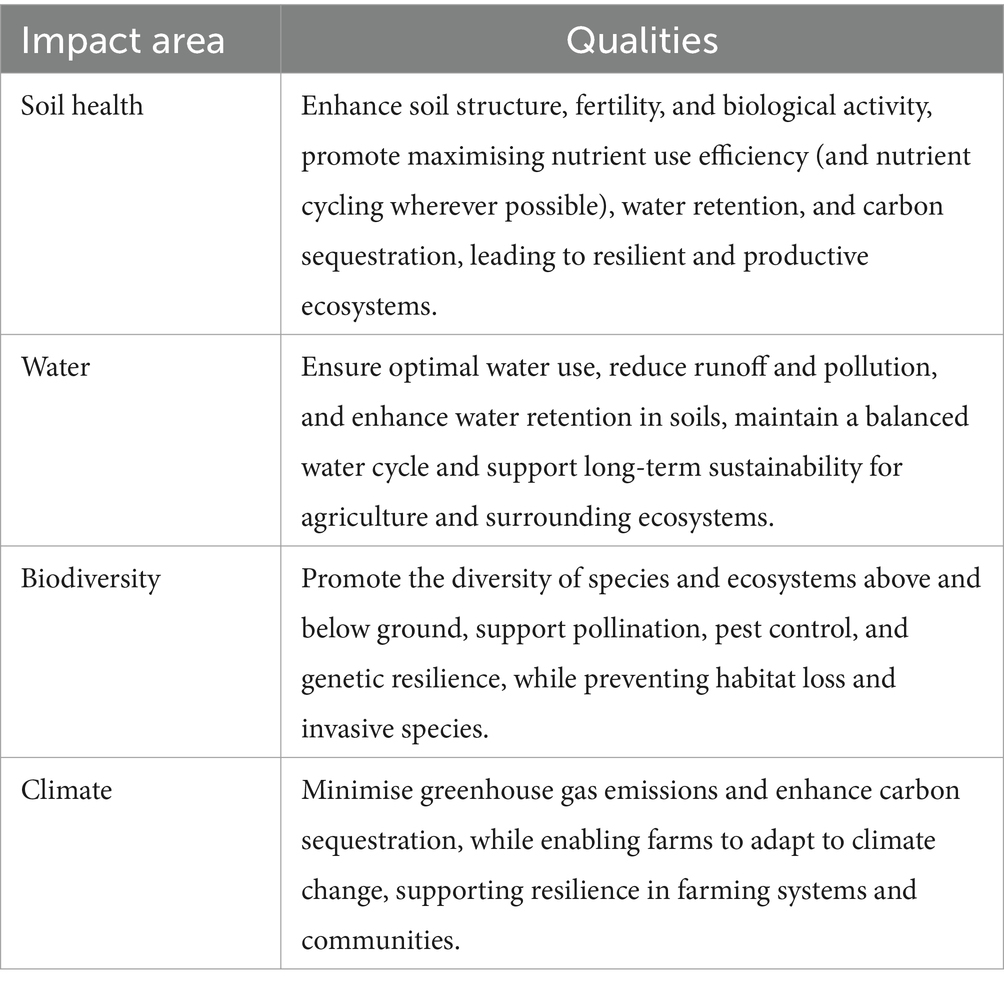
Table 1. The qualities of the four impact areas of SAI Platform’s Regenerating Together global framework for regenerative agriculture.
Based on the clustering, it became apparent that four categories were more prominent across the existing programmes. They are soil health (N = 21), water (N = 22), biodiversity (N = 21), and climate (N = 14). We defined these categories as core impact areas of our framework (Table 1). Impact areas are defined as broad environmental or social domains where regenerative agriculture seeks to create positive change. These areas represent key aspects of ecosystem health and sustainability that are directly affected by agricultural practices.
These impact areas shape our definition of regenerative agriculture, as seen in Box 1.
BOX 1 The definition of regenerative agriculture according to SAI Platform’s Regenerating Together global framework for regenerative agriculture.
Regenerative agriculture
“Regenerative agriculture is an outcome-based farming approach that protects and improves soil health, biodiversity, climate, and water resources while supporting farmer livelihoods.”
2.1.1 Regenerative agriculture outcomes and indicators
The identified impact areas served as the boundaries for the development of outcomes and indicators in our regenerative agriculture framework. Drawing from Newton et al.’s (2020, pg. 5) synthesis of outcomes included in definitions or descriptions of regenerative agriculture across 229 journal articles, we selected outcomes referenced five or more times. These outcomes were systematically mapped to the defined impact areas (Table 2). Two outcomes—pertaining to food security and nutritional quality—were deemed out of scope for our framework. Additionally, several outcomes related to farmer livelihoods and socio-economic dimensions were not presently reviewed.
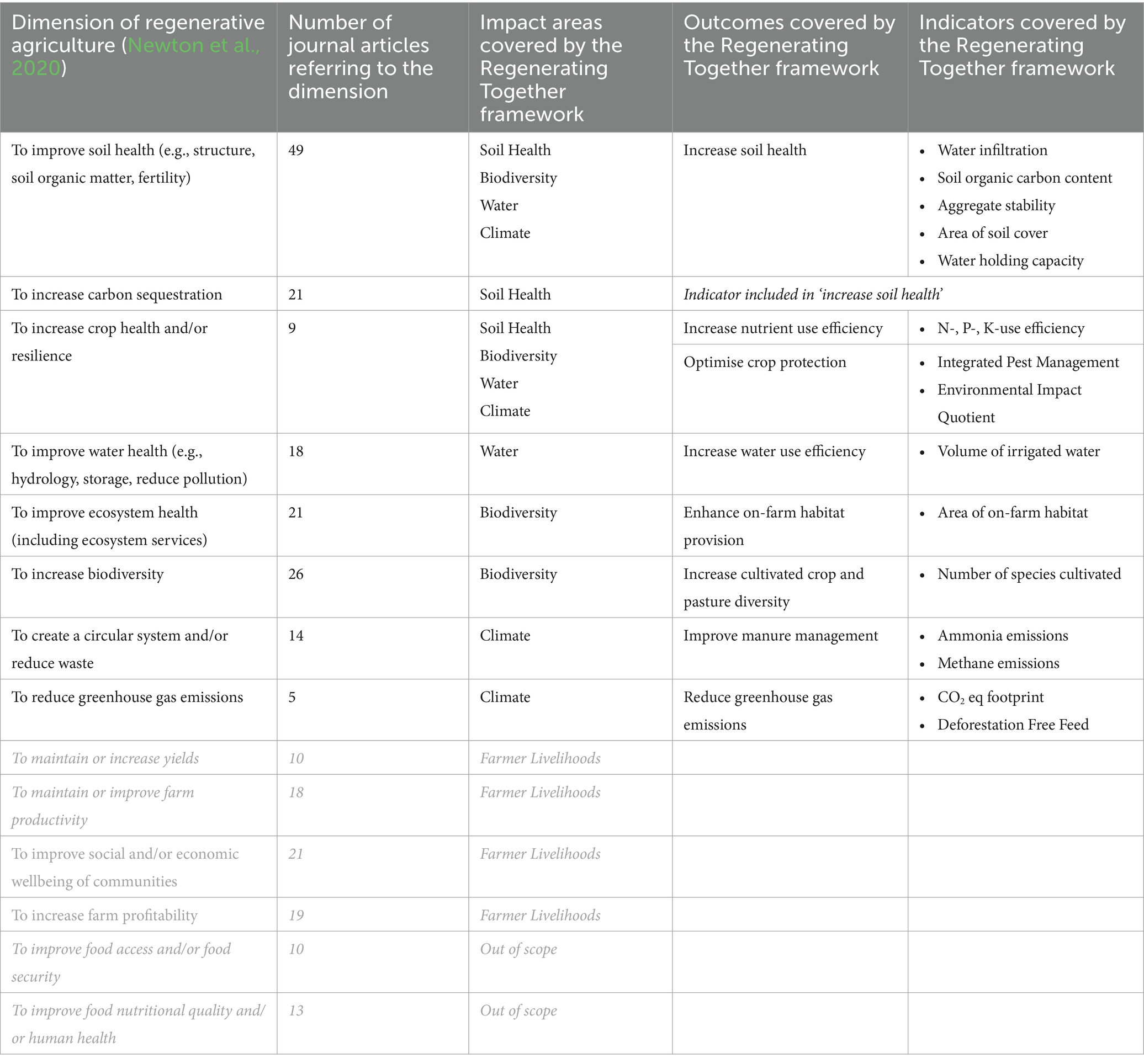
Table 2. Regenerative agriculture outcomes covered in journal articles reviewed by Newton et al. (2020), used in combination with existing industry-led frameworks to define eight outcomes and respective indicators included in SAI Platform’s Regenerating Together global framework for regenerative agriculture – Regenerating Together outcomes.
The assessment and reporting of indicators, particularly those addressing socio-economic factors in agricultural systems, involve significant complexities. Challenges include issues of data privacy, practical applicability, and the labour-intensive nature of semi-quantitative data collection (Wilson and Buller, 2001). Our landscape analysis corroborated this, revealing that many current initiatives lack systems for monitoring impacts within the socio-economic domain. Acknowledging the critical role of socio-economic factors in enabling the transition to regenerative agriculture (Klauser and Negra, 2020), we commit to incorporating farmer livelihoods in subsequent iterations of the framework. Meaningful and actionable socio-economic indicators will be defined, leveraging the approach utilised by the Consultative Group for International Agricultural Research (CGIAR) for “agronomic gain”—a framework encompassing productivity, environmental, and socio-economic impacts (Saito et al., 2021). In the interim, we emphasise the inclusion of socio-economic considerations in our broader definition of regenerative agriculture (Box 1).
Several rounds of consultation with subject matter experts from our membership and with SAI Platform’s Regenerating Together Advisory Board, which includes farmers, ranchers and academic experts in regenerative agriculture (Annex 3) were held using the guiding principles referred to above as review criteria. A refined list of eight outcomes across four impact areas was identified as key proxies for assessing progress towards regenerative agriculture for our framework.
For each identified outcome, corresponding indicators were established. We see indicators as means to measure and evaluate progress toward achieving specific outcomes. Acknowledging the limitations of single generic indicators for assessing complex outcomes (Gasso et al., 2015), some outcomes, such as “increased soil health,” are represented by multiple indicators. We are committed to continuously updating the list of indicators based on emerging science and stakeholder feedback (see Figure 1).
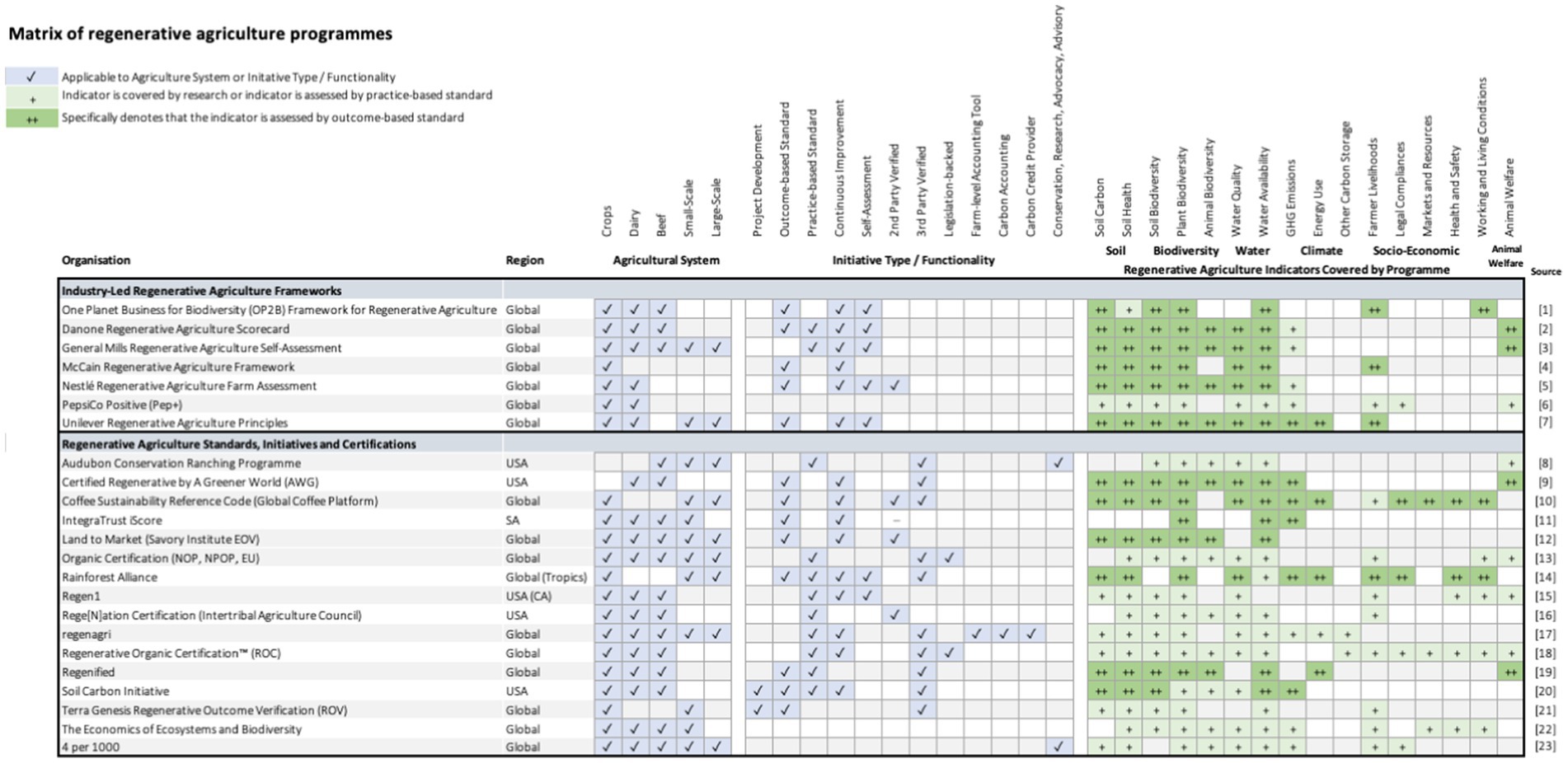
Figure 1. Landscape analysis of regenerative agriculture programmes. based on Kelley, 2021. Programmes are segmented into industry-led Frameworks or Standards (N = 7) or initiatives and certification schemes (N = 16). Each programme was evaluated against (1) the agricultural systems they address: crop and livestock, as well as scale of farming operations; (2) the regions they cover, (3) the type of programme they are and the function they serve, and (4) which regenerative agriculture indicators they address, either directly by outcome-based standard (++) or indirectly through practice-based standard (+) across the categories: soil, biodiversity, water, climate, socio-economic, animal welfare. References are provided in Annex 1.
2.2 Framework implementation process
Our review of existing programmes and frameworks revealed many existing frameworks were either narrowly focused—being specific to production systems, geographies, or practices—or broad in terms of blanked outcome and practice recommendations, independently of farming context, making them challenging to implement effectively at the farm level. Given the diverse needs of our global membership, we identified a clear gap: the need for a framework that is both globally applicable and adaptable to local conditions. This insight drove the development of our approach, which balances global relevance with local flexibility through the framework implementation steps outlined below.
In addition to the guiding principles, and review of existing programmes and frameworks, our framework’s implementation process was inspired by the proposition of Giller et al. (2021a, 2021b) to incorporate five questions in the design and implementation of regenerative agriculture. They are:
1. What is the problem to which regenerative agriculture is meant to be the solution?
2. What is to be regenerated?
3. What agronomic mechanisms will enable to facilitate this regeneration?
4. Can this mechanism be integrated into an agronomic practice that is likely to be economically and socially viable in a specific context?
5. What political, social and/or economic forces will drive the use of the new agronomic practice?
This led us to develop a four-step process for our Regenerating Together global framework for regenerative agriculture implementation (Figure 2). The individual elements of the four steps are shown in Table 3.
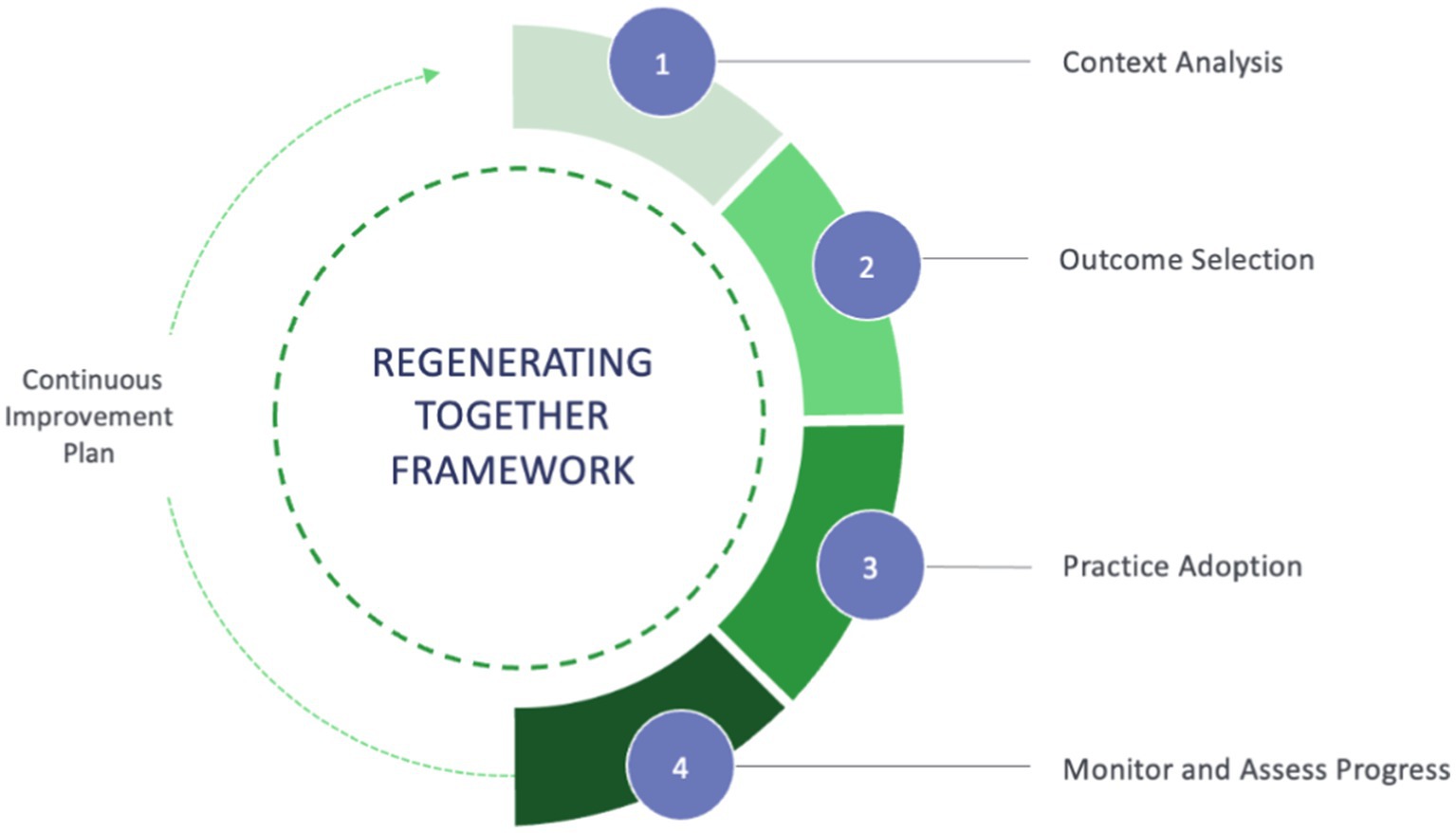
Figure 2. The four-step process to implement SAI Platform’s Regenerating Together global framework for regenerative agriculture.
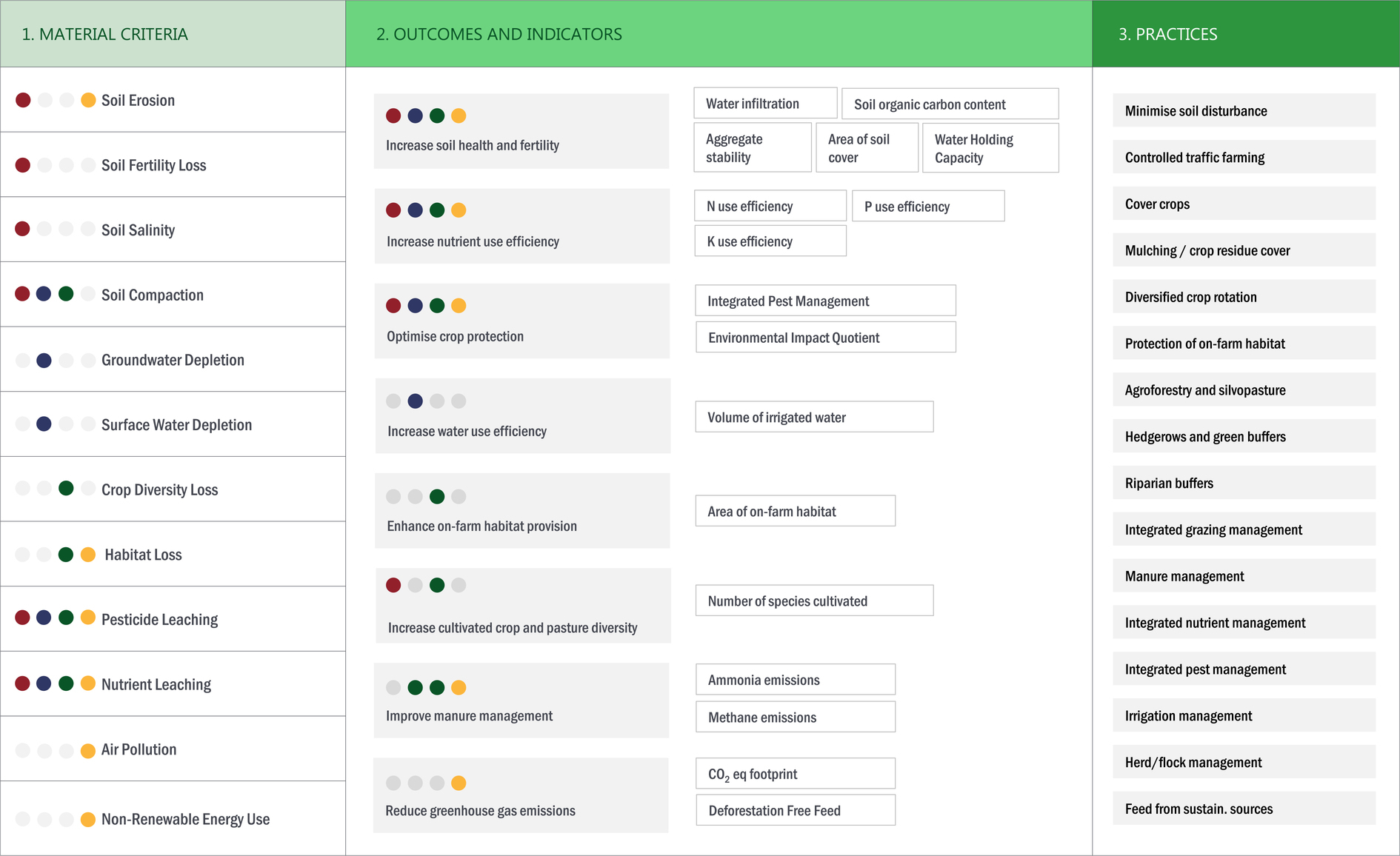
Table 3. An overview of SAI Platform’s Regenerating Together global framework for regenerative agriculture with material criteria, impact areas, outcomes, indicators, and practices to improve performance on outcomes.
2.2.1 Context analysis
This step helps farms gain a comprehensive understanding of their environmental context at both farm and landscape levels, identifying key inherent environmental risks associated with their specific farm or production system. It directly addresses the first guiding question in Giller et al. (2021a, 2021b) to identify the problem that regenerative agriculture aims to solve.
Agriculture is highly dependent on the context, shaped by agroecological and socio-economic factors such as climate, soil types, market access, infrastructure, and local knowledge (Giller et al., 2021a, 2021b). Furthermore, the environmental challenges and footprint of farming vary significantly depending on location and farming practices (FAO, 2000). For instance, in arid regions, water use may be a critical environmental constraint; whereas in other areas, the overuse of fertilisers and nutrient leaching could pose the main challenge. Given that existing definitions of regenerative agriculture propose a wide range of potential environmental benefits, we aimed to create an approach that identifies and addresses the most pressing environmental issues specific to a farming system.
To achieve this, we designed the first step of the framework to analyse the farm’s or production system’s context and identify the most significant environmental risks at both the farm and landscape levels. These risks were grouped into two categories: (1) production risks derived from environmental factors, such as weather patterns or water availability, and (2) environmental risks resulting from ongoing farming activities, such as biodiversity loss or excessive water extraction.
The aim of the context analysis is not just to identify the most critical risks within a given landscape but also to foster a shared understanding of material risks between farmers and companies that procure raw materials from them. This approach minimises the likelihood of imposing arbitrary outcomes and indicators on farmers and encourages a collaborative discussion about the most urgent challenges across the value chain. This provides a platform to co-create the roadmap of solutions to be adopted at farm level and enhance the adoption of regenerative agriculture practices by farmers (Silva et al., 2021).
Through consultations with members and stakeholders, we identified 12 material criteria across the four impact areas of our framework (Table 4). These criteria are scored on a scale of 1 to 3 based on predefined evaluation metrics, integrated into a questionnaire (Annex 2). It is important to underline that the purpose of this context analysis is to create a relative – and not an absolute – scoring of material criteria. The scoring process is intentionally subjective, serving as a foundation for constructive engagement between farms, their advisors and the food and beverage companies.
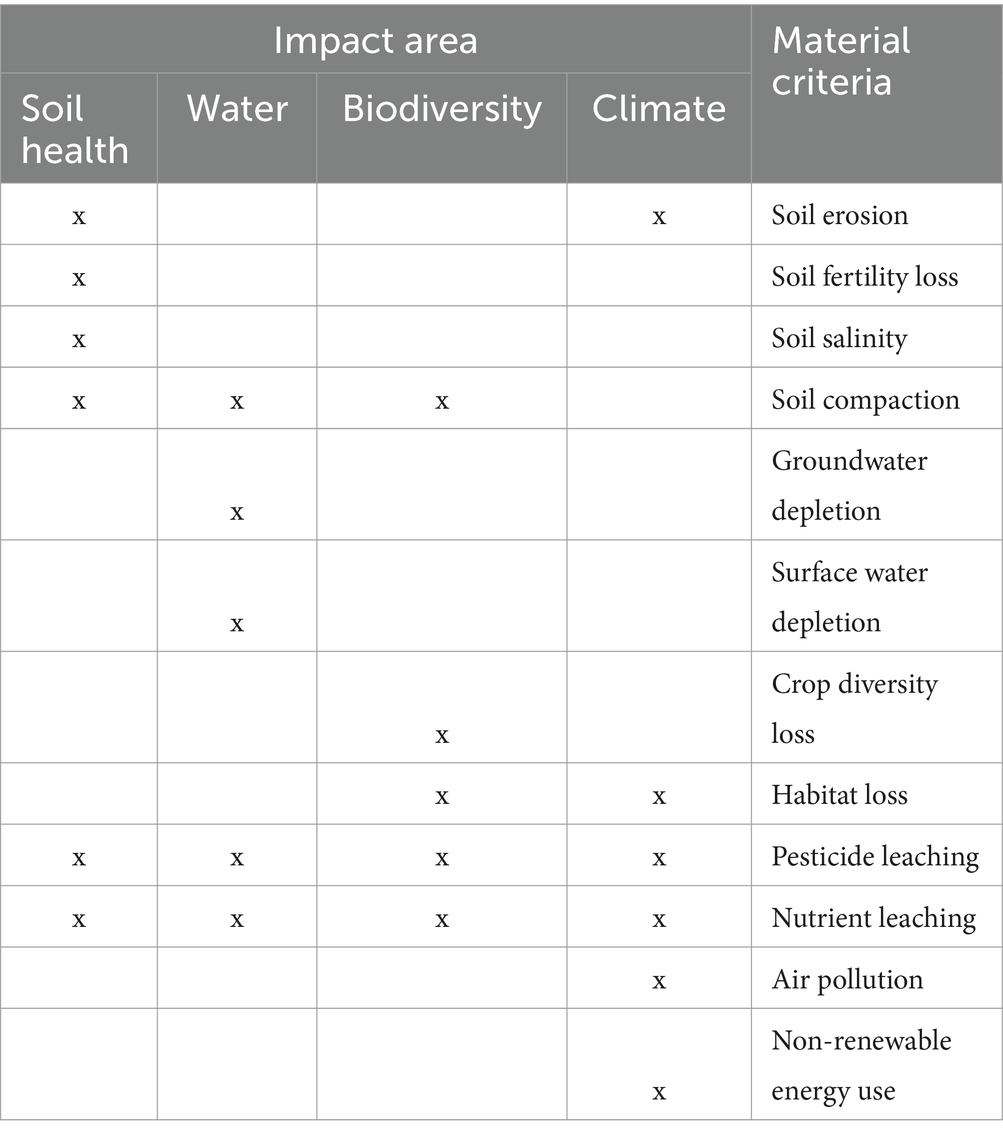
Table 4. Material criteria across the four impact areas [...] covered by SAI Platform’s Regenerating Together global framework for regnerative agriculture.
2.2.2 Outcome selection
Building on the findings from the context analysis, this step focuses on selecting and prioritising environmental outcomes that are most relevant to the specific farming context. Regenerative agriculture can target a wide range of outcomes (Newton et al., 2020), but their relevance may vary depending on the specific context (Giller et al., 2021a, 2021b). This step aligns with the second question in Giller et al. (2021a, 2021b) and reinforces the framework’s emphasis on defining relevant outcomes rather than imposing specific processes to achieve them.
We have defined outcomes as environmental improvements that result from the implementation of regenerative agricultural practices. As previously mentioned, this current version of the framework focuses on environmental outcomes, with social outcomes to be developed. Outcomes are the desired results within each impact area, e.g., healthy and productive soils.
Indicators are used to track and assess progress towards achieving outcomes. They provide data points that can be regularly monitored to quantify the effectiveness of regenerative practices. An overview of the definitions of impact areas, outcomes, and indicators is provided in Box 2.
BOX 2 Definitions of impact areas, outcomes and indicators of regenerative agriculture according to SAI Platform’s Regenerating Together global framework for regenerative agriculture.
Impact areas
Impact areas are broad environmental or social domains where regenerative agriculture seeks to create positive change. These areas represent key aspects of ecosystem health and sustainability that are directly affected by agricultural practices, including soil health, water, biodiversity and climate.
Outcomes
Outcomes are environmental or social improvements that result from the implementation of regenerative agricultural practices. Outcomes are the desired results within each impact area, e.g., healthy and productive soils.
Indicators
Indicators are used to track and assess progress towards achieving outcomes. They provide data points that can be regularly monitored to quantify the effectiveness of regenerative practices.
The outcome prioritisation is closely linked to the context analysis. It is facilitated by a simple binary matrix (Table 5), allowing farms to align their efforts with the most critical environmental challenges identified.
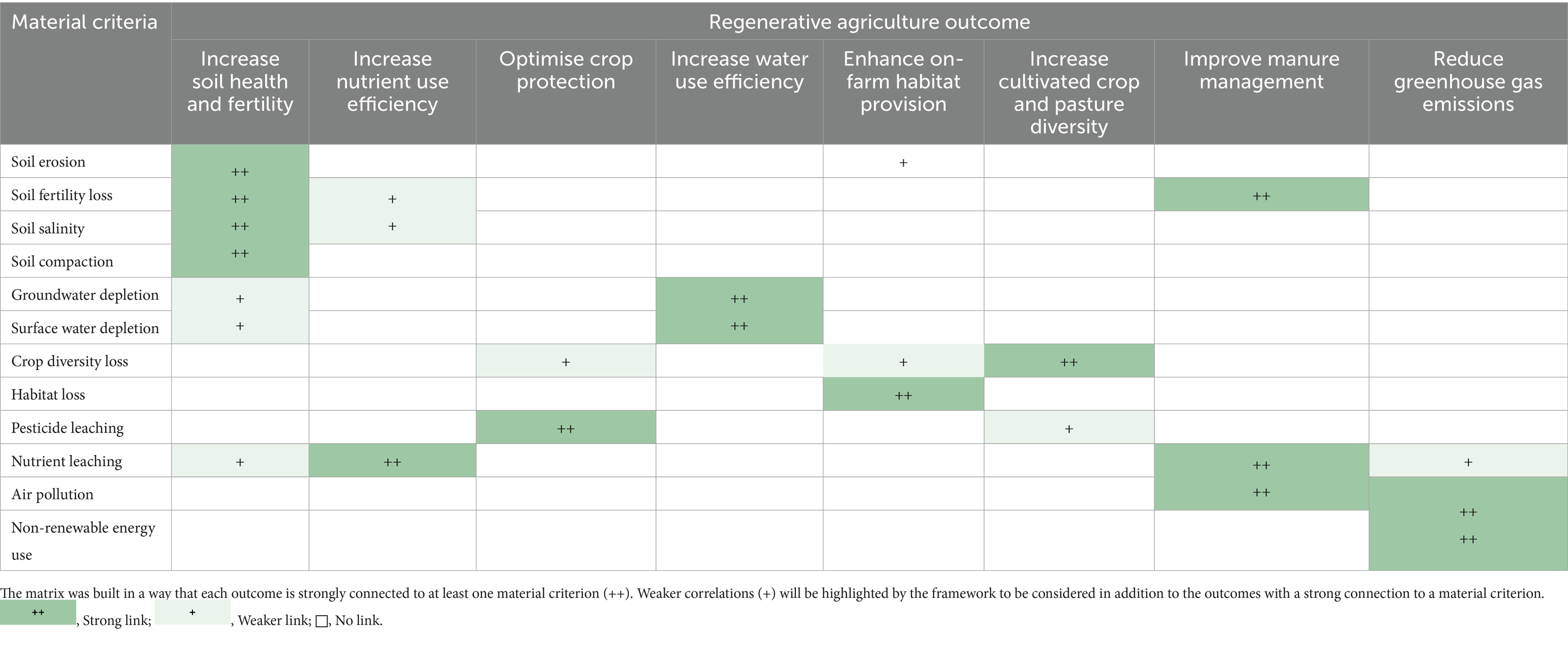
Table 5. Correlation indication matrix for the links between material criteria and outcomes to guide prioritisation of outcomes to report progress against in a farming system.
2.2.3 Practice adoption
This section addresses the third and fourth questions in Giller et al. (2021a, 2021b) by helping farmers select and implement practices that improve performance on prioritised outcomes based on local feasibility. The framework deliberately avoids prescribing specific practices, instead offering guidance on practices that could best achieve the desired results in each unique context.
As an outcome-based framework, our focus is on the improvement of farms or farm groups in relation to prioritised regenerative agriculture outcomes, tailored to the specific context of each farming operation (including production system, geography, and agroecology). However, measurable improvements in regenerative agriculture outcomes can take time to manifest and are often influenced by external factors beyond a farmer’s control, such as weather conditions. This poses a challenge when monitoring progress over time, especially when it comes to rewarding farmer groups for their efforts.
In some cases, farms may reach a point of saturation for certain outcomes, such as soil organic carbon (Berthelin et al., 2022), meaning further significant improvements may not be possible. Additionally, farms may be implementing good practices but lack the outcome data to demonstrate their efforts. Concerns have been raised that setting standards too high to qualify as part of the regenerative agriculture journey could discourage farmers from participating, as they may feel the goal is unattainable. Focusing solely on outcomes, therefore, may overlook the value and importance of practice adoption. There is growing evidence that certain practices directly contribute to the improvement of regenerative agriculture outcomes. We aim for our framework to promote an enabling environment for farms to receive the necessary support to select and adopt practices relevant and beneficial to their context, supporting them in making progress on their prioritised outcomes. Through various testing of our framework with farms across the world and conversing with the farmers on our Regenerating Together Advisory Board, it became apparent that communicating in terms of practices can be more impactful in driving on-the-ground change. Through a hybrid approach, we aim to leverage the selection of context-specific outcomes to identify the most suitable practices to be adopted and monitored. This approach aims to foster dialogue between farms and the food and beverage industry through locally relevant practice adoption, while, simultaneously monitoring outcomes, enabling companies to communicate their sustainability efforts at a corporate level. With this framework being outcome-based and acknowledging the importance of practices, rather than imposing specific practices, the framework empowers farms and their trusted advisors to select the practices that will lead to improved performance on prioritised outcomes. These practices are then integrated into continuous improvement plans, where farms report both the practices implemented and the extent of their implementation.
An overview of the regenerative agriculture practices included in our framework can be found in Table 6. The list does not include all the possible on-farm actions that farmers can implement but highlights some major practices that can contribute to regenerating agricultural systems, which must be adapted to the local context. This list of practices is intended to complement and build on publicly available resources that are available in certain geographies and jurisdictions that provide farms with technical and financial support for practice selection and adoption. Key examples include the United States Department of Agriculture’s Natural Resources Conservation Service (NRCS, 2024), which offers extensive guidance through its Conservation Practice Standards database, or the Strategic Plans of the EU’s member states falling under its Common Agricultural Policy (CAP, 2023). We are committed to growing the list of practices based on growing scientific and on-farm evidence and in alignment with overarching agricultural policy frameworks.
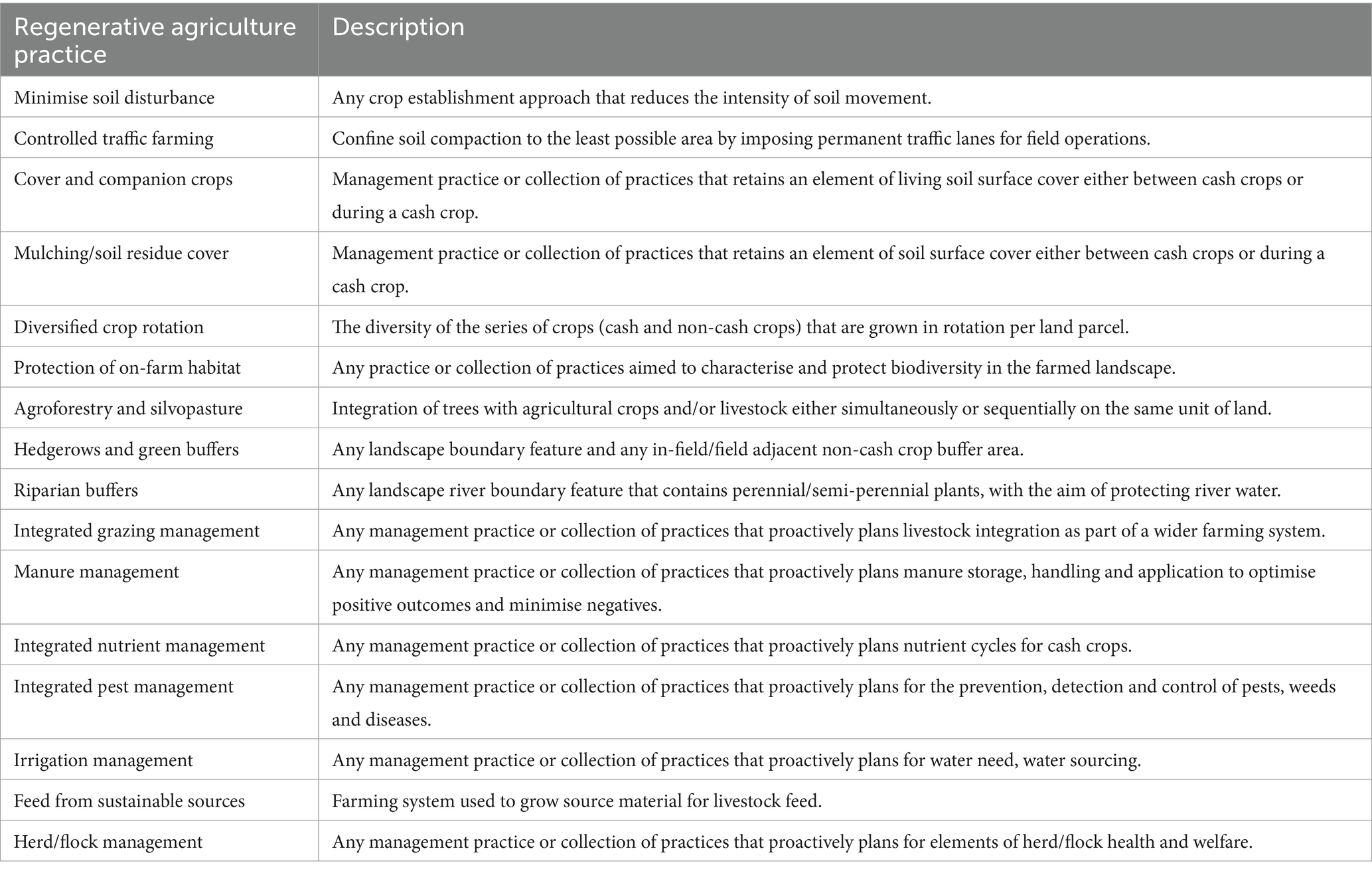
Table 6. Regenerative agriculture practices and their descriptions included in SAI Platform’s Regenerating Together global framework for regenerative agriculture.
To support this process, the framework suggests practices that are likely to enhance performance against the prioritised outcomes, drawing from existing research and data. The initial dataset has been developed for field crops in temperate farming systems, based on a structured review of 114 publications identified through a rapid review of scientific literature (Threels et al., 2025). This work was inspired by Giller et al. (2023) who operationalised the concept of regenerative agriculture for coffee and cocoa production systems. Table 7 presents the results of this analysis, linking various regenerative agriculture practices to specific outcomes, with an emphasis on both the strength of the connection and the supporting evidence.
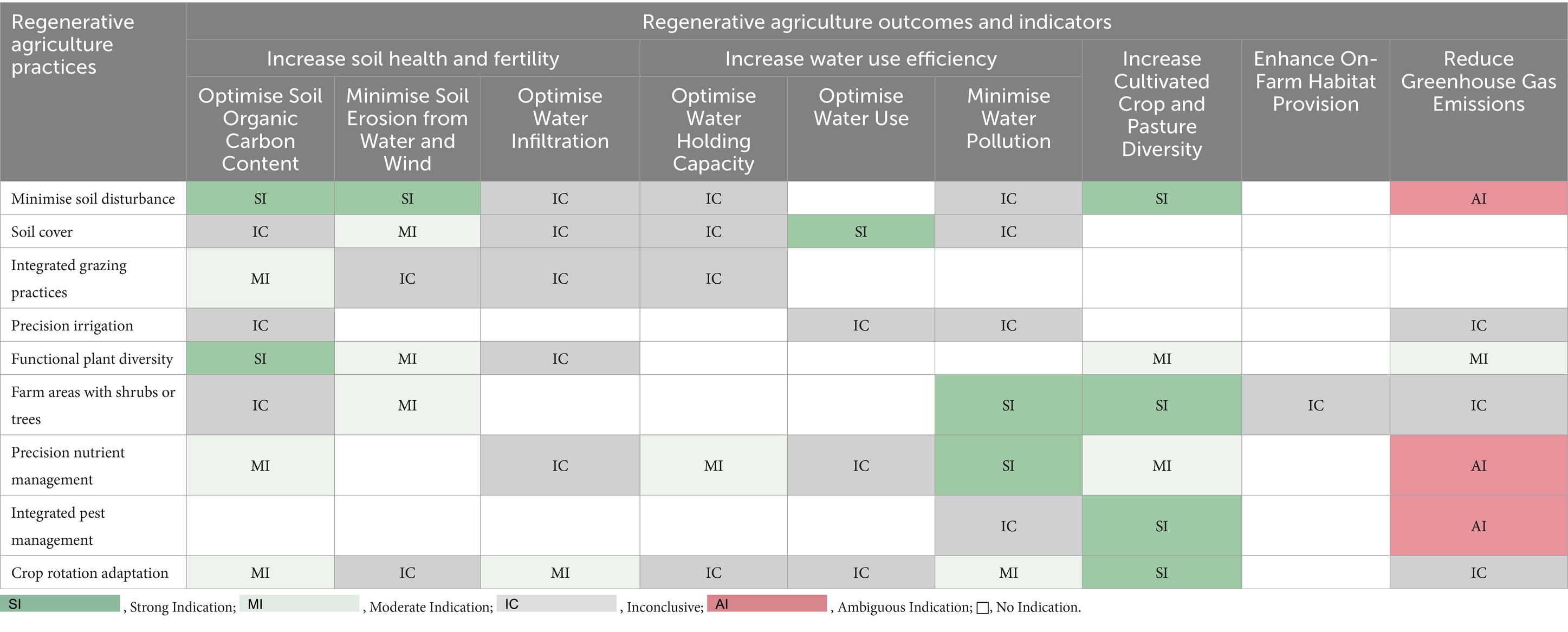
Table 7. Correlation indication matrix for the links between practice categories and SAI Platform’s Regenerating Together regenerative outcomes for arable farming systems, adapted from Threels et al. (2025).
We are currently collaborating with partners to expand this work across other farming system archetypes, including perennial crops, housed livestock, grazed livestock, and mixed farming systems, among others.
It is important to note that the practices listed in Table 7 are not exhaustive. Farms and farm advisors are encouraged to select practices relevant to their systems, provided they result in improved performance against the prioritised outcomes.
2.2.4 Monitor and assess progress
Ongoing evaluation of progress towards outcomes is crucial for accurately measuring the long-term impact of regenerative agriculture, ensuring that the intended environmental benefits are realised and sustained over time (Newton et al., 2020). This includes setting baselines and monitoring progress over time.
With the intent to acknowledge and reward farms that have engaged in regenerative agriculture and are improving their performance on regenerative agriculture outcomes, we have developed distinct performance levels to serve as the basis for incentive mechanisms and market access. Verified claims form the cornerstone of most incentive programmes for promoting sustainable agriculture (Salzman et al., 2018).
The performance levels have been based on the review of existing industry frameworks for regenerative agriculture and refined based on consecutive rounds of consultation with SAI Platform members and SAI Platform’s Regenerating Together Advisory Board. Today, our global framework for regenerative agriculture defines four performance levels to capture distinct farmer engagement and progress towards outcomes (Table 8). They have the ambition to accommodate different realities across farming systems worldwide. For instance, access to data, resources, and incentives to shift towards regenerative agriculture might differ depending on location and value chain. We propose for the engaging, advancing, and leading levels to be eligible for accounting towards regenerative agriculture impact commitments, and to stimulate peer pressure to go beyond the engaging level in more developed geographies and value chains.

Table 8. Regenerating Together Performance Levels, including their requirements, against SAI Platform’s Regenerating Together global framework for regenerative agriculture.
3 Discussion
Operationalising the concept of regenerative agriculture at scale is a formidable challenge. It often requires substantial changes in farming operations as farmers must adapt new practices, acquire new knowledge and equipment, and engage in new value chains. Additionally, many regenerative agricultural value chains impose extra layers of reporting to ensure compliance with production standards and corporate impact claims.
The hereby presented framework aims to facilitate the widespread adoption of regenerative agriculture practices globally by addressing key barriers that have hindered scaling efforts thus far, namely:
• The lack of a unified definition of regenerative agriculture limits the ability to consistently assess and report impact (Newton et al., 2020). This is exacerbated by the existence of various frameworks for regenerative agriculture with different outcomes and processes, creating confusion on approaches to follow.
• A need to translate global concepts into localised action plans, enabling farm-level transitions and allowing farmers to focus on prioritising actions most relevant to their unique contexts (Giller et al., 2021a, 2021b).
• A need to balance between academically driven frameworks with emphasis on science that often lack attention to the implementation aspects as well as the frameworks developed by the private sector, focusing on being practical and resource-efficient (de Olde et al., 2018; Saltelli and Giampietro, 2017).
Amidst the proliferation of diverse initiatives for regenerative agriculture, we identified a clear need for a framework that is practical to implement to be widely accepted across the food and beverage industry. Such a framework aims to establish a standardised approach to implementation, enabling farmers to participate in regenerative agriculture without constraining them to specific supply chains or certification schemes. It also aims to acknowledge and reward farms for their efforts by qualifying for different performance levels. Further, the hereby presented framework offers the possibility for an independent verification process to allow companies to make claims related to their sustainable and regenerative sourcing efforts, thus aiming to safeguard the concept of regenerative agriculture and reward farms for their engagement. As an organisation representing over 190 companies within the food and beverage sector, SAI Platform is distinctively positioned to foster industry alignment around a shared definition and framework for regenerative agriculture.
To minimise duplication in assessment and reporting efforts, our framework is grounded in outcome indicators derived from existing regenerative agriculture frameworks while integrating recent scientific advancements. This approach is reflected in two ways. First, our focus on the four impact areas—soil health, biodiversity, water, and climate—aligns with the priorities identified in most publicly available programmes and initiatives reviewed. Second, we incorporate mechanisms to contextualise regenerative agriculture interventions based on specific farming systems rather than prescribing blanket practice recommendations (Giller et al., 2021a, 2021b). Additionally, our framework aims to enable transparent, harmonizable and context-specific selection, assessment and reporting of regenerative agriculture outcomes. It allows flexibility in selecting indicators for implementing regenerative agriculture, as advocated by Schreefel et al. (2024).
We believe that the hereby presented framework offers a unified approach to regenerative agriculture that will create a level playing field for farmers and suppliers to engage in regenerative agriculture. As some existing frameworks for regenerative agriculture have already been used to start regenerative agriculture projects or included in supplier contracts by the food and beverage industry, we are also developing a mechanism for these frameworks to be benchmarked against what is presented here. This to avoid farmers being locked in specific frameworks and value chains and make sure regeneratively produced raw materials can be sold and sourced through diverse channels.
Our framework follows an outcome-based definition of regenerative agriculture (Newton et al., 2020) to avoid imposing specific practices on farmers independently of context, which can lead to limited adoption and impact. This has for instance been shown in the case of conservation agriculture in Africa (Giller et al., 2015; Palm et al., 2014). However, an outcome-based approach offers several challenges itself:
Firstly, outcomes must be well-defined and meaningful (Newton et al., 2020). Through continuous consultations with members, academics, and farmers, we believe that we have established a list of outcomes and respective indicators that can serve as meaningful and quantifiable proxies for the impact of farming on the environment. However, this list presents a first iteration that is heavily theoretical. We will therefore continue to refine and improve it based on feedback from users and stakeholders.
Secondly, priorities for environmental outcomes can be different along the value chain. Whereas the food and beverage sector is under strong pressure to reduce greenhouse gas emissions in their supply chains (Shrimali, 2021), farmers often respond to changes in practices that lead to more tangible benefits for them, such as productivity, resilience of production, and production costs (Klauser and Negra, 2020). Our framework’s context analysis is designed to foster collaboration between farmers and their customers in setting priorities. Although we are aware that the hereby presented framework cannot address al potential power imbalances in negotiations between farmers and processors, we designed the framework to emphasise farmer engagement and co-creation of continuous improvement plans as key to capture the adaptability and relevance to on-farm contexts and farmer-inclusion in decision-making processes. We are committed to building case studies that exemplify good practices, focusing on co-creation and farmer engagement rather than imposition and box-ticking.
Thirdly, the direct measurement and reporting of many outcomes can be technically challenging, expensive, and tedious (Latruffe et al., 2016). To avoid overburdening farmers with monitoring requirements, we emphasise a pragmatic approach to quantification. Many farmers already report on outcomes due to regulatory or incentive schemes; therefore, we allow flexibility in the metrics and quantification methodologies they use, provided they meaningfully reflect progress. To ensure that the framework inspires “doing” rather than “monitoring,” we see it as a paradigm to keep the quantification and reporting burden low. Furthermore, certain outcomes, such as soil organic carbon, can take years to show improvement (Moinet et al., 2023; Powlson et al., 2014). In such cases, we recommend incentivising the adoption of practices with strong evidence of positive long-term impact. This approach has been successfully applied to coffee and cocoa farming (Giller et al., 2023) and replicated for field crops (Threels et al., 2025). We are working to extend this to other farming systems.
Lastly, we must emphasize that the hereby proposed framework entirely focuses on agricultural production only. However, to create regenerative and equitable agricultural systems and value chains, other aspects to be addressed as well. These include food packaging, transport, waste, as well as broader shifts in nutrition, which are beyond the scope of this paper, but are featured in recent literature, such as the EAT Lancet report on Healthy Diets from Sustainable Food Systems (Willet et al., 2019).
4 Conclusion and outlook
We view regenerative agriculture as a process of continuous improvement toward the improvement of crucial environmental resources that comprises four steps.
1. Context specific identification of the inherent ecological risks and crucial resources within a farming system.
2. Determination of outcomes which should be prioritised and monitored to effectively mitigate these key risks and improve the condition of crucial resources.
3. Selection and adoption of locally relevant and appropriate practices that improve performance on prioritised environmental outcomes.
4. Continuously monitor and evaluate whether the implemented practices lead to improvements in regenerative agriculture outcomes, which is crucial for validating and reporting progress.
With the hereby presented framework, we aim to take the first step in defining regenerative agriculture for the food and beverage sector. By doing so, we seek to actively facilitate discussions across diverse stakeholder groups on what regenerative agriculture entails and the outcomes we can expect from farms and the supply chains that adopt regenerative agriculture practices (Newton et al., 2020). This will lead to the continuous improvement of our framework and its implementation based on learning and stakeholder input. Our framework intends to provide a common language, allowing decision-makers to use the same principles to tailor the transitions to their contexts.
SAI Platform and its membership are committed to supporting the adoption of regenerative agriculture practices in their supply chains. To do so, many member companies and partners have already committed to implementing the hereby presented framework with their suppliers across a wide range of agricultural products and commodities. These activities span across diverse farming systems—from smallholder farms in South Asia and Africa to large-scale commodity farming in Europe, North America, and Latin America. SAI Platform is dedicated to supporting these efforts through developing resources to support the implementation of the framework, such as protocols for verifying claims based on regenerative agriculture performance levels and guidance for establishing baselines and monitoring progress on the framework’s outcomes. These resources are currently being tested with selected members and partners and will be released early in 2025. SAI Platform will also support members in implementing the framework and using supporting resources through projects and partnerships globally. These projects will start in 2025 and involve diverse partners from implementation, academia, philanthropy, and finance. Feedback from these activities will be systematically collected to continuously improve the framework and the solutions that support its implementation to make sure our solutions are robust and implementable at scale. To foster collaboration and dialogue between the stakeholders across the sector, we intend to share and disseminate the learnings. Additionally, through these projects on the ground, we aim to understand how the transition to regenerative agriculture impacts farmer livelihoods. In future iterations, we aim to include socio-economic indicators to capture this dimension more effectively.
Overall, it must be underlined that changes in practices and behavior work best if they are based on inspiration, rather than imposition (Gill, 2002). We therefore see it as our role to inspire our members, as well as the broader sector through case studies and sharing of learnings that will be acquired during piloting and implementation of the framework.
Recognising that the food and beverage industry is just one link in the broader agricultural value chain, we propose this framework as a starting point for consultation and engagement with stakeholders across all levels of agricultural production systems and value chains. By releasing the framework and transparently sharing the methodology behind it, we aim to continue to foster a dialogue with diverse stakeholders—including farmers, academia, civil society, the public sector, and industry partners. Our goal is to co-create a shared vision for regenerative agriculture. This approach emphasises proposing rather than imposing a vision of what regenerative agriculture can achieve and the outcomes we can expect.
A shift to more sustainable – or regenerative – agriculture is urgently needed. With the hereby proposed framework, we want to contribute to making this shift happen and to engage with farmers, academia, civil societies, the public sector, and industry in doing so.
Data availability statement
The original contributions presented in the study are included in the article/Supplementary material, further inquiries can be directed to the corresponding author.
Author contributions
DK: Conceptualization, Investigation, Methodology, Visualization, Writing – original draft, Writing – review & editing. JC: Conceptualization, Data curation, Formal analysis, Investigation, Methodology, Project administration, Validation, Visualization, Writing – original draft, Writing – review & editing. AC: Conceptualization, Methodology, Writing – review & editing. YL: Resources, Validation, Writing – review & editing. ID: Formal analysis, Funding acquisition, Resources, Writing – review & editing. MargH: Writing – review & editing. SL: Writing – review & editing. RT: Writing – review & editing. JL: Writing – review & editing. MartH: Writing – review & editing. PC: Writing – review & editing. LU: Writing – review & editing. RC: Formal analysis, Methodology, Writing – review & editing. DF: Funding acquisition, Methodology, Resources, Supervision, Writing – original draft, Writing – review & editing.
Funding
The author(s) declare that no financial support was received for the research and/or publication of this article.
Conflict of interest
YL was employed by McCain Foods. ID was employed by Nordic Sugar A/S. MargH was employed by PepsiCo. SL was employed by Danone. RT was employed by Kepak Group. JL was employed by Arla Foods. MartH was employed by Kraft Heinz Company. PC was employed by Nestlé SA. LU was employed by Unilever.
The remaining authors declare that the research was conducted in the absence of any commercial or financial relationships that could be construed as a potential conflict of interest.
Generative AI statement
The author(s) declare that no Gen AI was used in the creation of this manuscript.
Publisher’s note
All claims expressed in this article are solely those of the authors and do not necessarily represent those of their affiliated organizations, or those of the publisher, the editors and the reviewers. Any product that may be evaluated in this article, or claim that may be made by its manufacturer, is not guaranteed or endorsed by the publisher.
Supplementary material
The Supplementary material for this article can be found online at: https://www.frontiersin.org/articles/10.3389/fsufs.2025.1576611/full#supplementary-material
References
Aryal, J. P., Rahut, D. B., Sonobe, T., Tortajada, C., and Chhay, P. (2024). Water resource management in agriculture for achieving food and water security in Asia. Int. J. Water Res. Dev. 40, 319–322. doi: 10.1080/07900627.2024.2332222
Benton, T. G., Bieg, C., Harwatt, H., Pudasaini, R., and Wellesley, L. (2021). Food system impacts on biodiversity loss three levers for food system transformation in support of nature.
Berthelin, J., Laba, M., Lemaire, G., Powlson, D., Tessier, D., Wander, M., et al. (2022). Soil carbon sequestration for climate change mitigation: mineralization kinetics of organic inputs as an overlooked limitation. Eur. J. Soil Sci. 73, 1–9. doi: 10.1111/ejss.13221
Campbell, B. M., Thornton, P., Zougmoré, R., van Asten, P., and Lipper, L. (2014). Sustainable intensification: what is its role in climate smart agriculture? Curr. Opinion Environ. Sustain. 8, 39–43. doi: 10.1016/j.cosust.2014.07.002
CAP. (2023). The common agricultural policy: 2023-27. European Commission. Available online at: https://agriculture.ec.europa.eu/common-agricultural-policy/cap-overview/cap-2023-27_en
Conrad, Z., Niles, M. T., Neher, D. A., Roy, E. D., Tichenor, N. E., and Jahns, L. (2018). Relationship between food waste, diet quality, and environmental sustainability. PLoS One 13:e0195405. doi: 10.1371/journal.pone.0195405
Dasgupta, P. (2021). Economics of biodiversity: the Dasgupta review: headline messages. London: HM Treasury.
de Olde, E. M., Sautier, M., and Whitehead, J. (2018). Comprehensiveness or implementation: challenges in translating farm-level sustainability assessments into action for sustainable development. Ecol. Indic. 85, 1107–1112. doi: 10.1016/j.ecolind.2017.11.058
European Commission (EC). (2023). Approved 28 CAP strategic plans (2023-2027). Summary overview for 27 member states. Facts and figures. Retrieved from European Commission. Available online at: https://agriculture.ec.europa.eu/cap-my-country/cap-strategic-plans_en
Folke, C., Polasky, S., Rockström, J., Galaz, V., Westley, F., Lamont, M., et al. (2021). Our future in the Anthropocene biosphere. Ambio 50, 834–869. doi: 10.1007/s13280-021-01544-8
Francis, C. A., Harwood, R. R., and Parr, J. F. (1986). The potential for regenerative agriculture in the developing world. Am. J. Altern. Agric. 1, 65–74. doi: 10.1017/S0889189300000904
Gasso, V., Oudshoorn, F., de Olde, E., and Sørensen, C. (2015). Generic sustainability assessment themes and the role of context: the case of Danish maize for German biogas. Ecol. Indic. 49, 143–153. doi: 10.1016/j.ecolind.2014.10.008
Gill, R. (2002). Change management--or change leadership? J. Chang. Manag. 3, 307–318. doi: 10.1080/714023845
Giller, K. E., Andersson, J. A., Corbeels, M., Kirkegaard, J., Mortensen, D., Erenstein, O., et al. (2015). Beyond conservation agriculture. Front. Plant Sci. 6, 1–14. doi: 10.3389/fpls.2015.00870
Giller, K. E., Delaune, T., Vasco Silva, J., Descheemaeker, K., van de Ven, G., Schut, A. G., et al. (2021a). The future of farming: who will produce our food? FoodSecurity 13:10731099. doi: 10.1007/s12571-021-01184-6/Published
Giller, K. E., Hijbeek, R., Andersson, J. A., and Sumberg, J. (2021b). Regenerative Agriculture: An agronomic perspective. Outl. Agric. 50, 13–25. doi: 10.1177/0030727021998063
Giller, K. E., Pulleman, M., Sassen, M., Pronk, A., Pratihast, A., Velthof, G., et al. (2023). Ground zero? Let’s get real on regeneration: report 1: state of the art and indicator selection. Wageningen (Netherlands): WUR. 66.
Gliessman, S. (2018). Defining agroecology. Agroecol. Sustain. Syst. 42, 599–600. doi: 10.1080/21683565.2018.1432329
Godfrey, L. (2021). The circular economy as development opportunity exploring circular economy opportunities across south Africa’s economic sectors edited by.
Goswami, R., Saha, S., and Dasgupta, P. (2017). Sustainability assessment of smallholder farms in developing countries. Agroecol. Sustain. Food Syst. 41, 546–569. doi: 10.1080/21683565.2017.1290730
Hong, C., Zhao, H., Qin, Y., Burney, J. A., Pongratz, J., Hartung, K., et al. (2022). Land-use emissions embodied in international trade. Available online at: https://www.science.org
Kassam, A., Friedrich, T., and Derpsch, R. (2019). Global spread of conservation agriculture. Int. J. Environ. Stud. 76, 29–51. doi: 10.1080/00207233.2018.1494927
Kelley, S. (2021). Background and guidance for the textile exchange regenerative agriculture outcome framework V1. Available online at: https://textileexchange.org/app/uploads/2023/07/Regen-Ag_Background-Guidance.pdf
Klauser, D., and Negra, C. (2020). Getting down to earth (and business): focus on African smallholders’ incentives for improved soil management. Frontiers in sustainable food systems 4, 1–10. doi: 10.3389/fsufs.2020.576606
Laine, J. E., Huybrechts, I., Gunter, M. J., Ferrari, P., Weiderpass, E., Tsilidis, K., et al. (2021). Co-benefits from sustainable dietary shifts for population and environmental health: an assessment from a large European cohort study. Lancet Planet. Health 5, e786–e796. doi: 10.1016/S2542-5196(21)00250-3
Lal, R. (2020). Regenerative agriculture for food and climate. J. Soil Water Conserv. 75, 123A–124A. doi: 10.2489/jswc.2020.0620A
Latruffe, L., Diazabakana, A., Bockstaller, C., Desjeux, Y., Finn, J., Kelly, E., et al. (2016). Measurement of sustainability in agriculture: a review of indicators. Stud. Agric. Econ. 118, 123–130. doi: 10.7896/j.1624
Moinet, G. Y. K., Hijbeek, R., van Vuuren, D. P., and Giller, K. E. (2023). Carbon for soils, not soils for carbon. Glob. Chang. Biol. 29, 2384–2398. doi: 10.1111/gcb.16570
National Academies of Sciences, Engineering, and Medicine (2019). Negative emissions technologies and reliable sequestration: A research agenda. Washington, DC: The National Academies Press.
Newton, P., Civita, N., Frankel-Goldwater, L., Bartel, K., and Johns, C. (2020). What is regenerative agriculture? A review of scholar and practitioner definitions based on processes and outcomes. Front. Sustain. Food Syst. 4, 1–11. doi: 10.3389/fsufs.2020.577723
NRCS. (2024). Conservation practice standards. Natural Resources Conservation Service U.S. Department of Agriculture. Available online at: https://www.nrcs.usda.gov/resources/guides-and-instructions/conservation-practice-standards
Palm, C., Blanco-Canqui, H., DeClerck, F., Gatere, L., and Grace, P. (2014). Conservation agriculture and ecosystem services: an overview. Agric. Ecosyst. Environ. 187, 87–105. doi: 10.1016/j.agee.2013.10.010
Poore, J., and Nemecek, T. (2018). Reducing food’s environmental impacts through producers and consumers. Available online at: https://www.science.org
Powlson, D. S., Stirling, C. M., Jat, M. L., Gerard, B. G., Palm, C. A., Sanchez, P. A., et al. (2014). Limited potential of no-till agriculture for climate change mitigation. Nat. Clim. Change 4, 678–683. doi: 10.1038/nclimate2292
Pretty, J., and Bharucha, Z. P. (2014). Sustainable intensification in agricultural systems. Ann. Bot. 114, 1571–1596. doi: 10.1093/aob/mcu205
Rhodes, C. J. (2017). The imperative for regenerative agriculture. Sci Prog, 100, 80–129. doi: 10.3184/003685017X14876775256165
Richardson, K., Steffen, W., Lucht, W., Bendtsen, J., Cornell, S. E., Donges, J. F., et al. (2023). Earth beyond six of nine planetary boundaries. Available online at: https://www.science.org
Rigby, D., and Caceres, D. (2001). Organic farming and the sustainability of agricultural systems. Available online at: www.elsevier.com/locate/agsy
Rodale, R. (1986). Learning to think Regeneratively. Bull. Sci. Technol. Soc. 6, 6–13. doi: 10.1177/027046768600600104
SAI Platform. (2021). Sustainable Agriculture Principles & Practices. Available online at: www.ipcc.ch/site/assets/uploads/sites/4/2020/08/200730-
Saito, K., Six, J., Komatsu, S., Snapp, S., Rosenstock, T., Arouna, A., et al. (2021). Agronomic gain: definition, approach, and application. Field Crops Res. 270:108193. doi: 10.1016/j.fcr.2021.108193
Saltelli, A., and Giampietro, M. (2017). What is wrong with evidence based policy, and how can it be improved? Futures 91, 62–71. doi: 10.1016/j.futures.2016.11.012
Salzman, J., Bennett, G., Carroll, N., Goldstein, A., and Jenkins, M. (2018). The global status and trends of payments for ecosystem services. Nat. Sustain. 1, 136–144. doi: 10.1038/s41893-018-0033-0
Schreefel, L., Creamer, R. E., van Zanten, H. H. E., de Olde, E. M., Schrijver, A. P., de Boer, I., et al. (2024). How to monitor the ‘success’ of (regenerative) agriculture: a perspective. Glob. Food Sec. 43:100810. doi: 10.1016/j.gfs.2024.100810
Schreefel, L., Schulte, R. P. O., de Boer, I. J. M., Schrijver, A. P., and van Zanten, H. H. E. (2020). Regenerative agriculture – the soil is the base. Glob. Food Sec. 26:100404. doi: 10.1016/j.gfs.2020.100404
Searchinger, T., Waite, R., Beringer, T., Forslund, A., Guyomard, H., Le Mouël, C., et al. (2018). Creating a sustainable food future. In Agency for International Development. EcoAgiculture Partners. Available online at: https://www.wri.org/our-work/project/world-resources-report/publications
Shrimali, G. (2021). Scope 3 emissions: measurement and management 1 April 2021 sustainable finance initiative scope 3 emissions: measurement and management working paper. Available online at: https://home.barclays/society/our-position-on-climate-change/highlights/
Silva, E., Lundgren, J., Tittonell, P., and Nl, A. T. (2021). Regenerative agriculture—agroecology without politics? Available online at: https://regenorganic.org
Stevenson, J., Vanlauwe, B., Macours, K., Johnson, N., Krishnan, L., Place, F., et al. (2019). Farmer adoption of plot- and farm-level natural resource management practices: between rhetoric and reality. Glob. Food Secur. 20, 101–104. doi: 10.1016/j.gfs.2019.01.003
Threels, J., Contreras, M., Jongelings, T., Kievit, W. J., Niu, Q., Manolis, R. T., et al. (2025). “Towards regeneration: deciphering the relationships between agricultural practices and regenerative outcomes” in ACT 3318 project report Ed. Klauser, D. (Wageningen University).
van Bussel, L. M., Kuijsten, A., Mars, M., and van ‘t Veer, P. (2022). Consumers’ perceptions on food-related sustainability: a systematic review. J. Clean. Prod. 341:130904. doi: 10.1016/j.jclepro.2022.130904
van Dijk, M., Morley, T., Rau, M. L., and Saghai, Y. (2021). A meta-analysis of projected global food demand and population at risk of hunger for the period 2010–2050. Nat. Food 2, 494–501. doi: 10.1038/s43016-021-00322-9
Walsh, C., Renn, M., Klauser, D., de Pinto, A., Haggar, J., Abdur, R., et al. (2024). Translating theory into practice: a flexible decision-making tool to support the design and implementation of climate-smart agriculture projects. Agric. Syst. 219:104060. doi: 10.1016/j.agsy.2024.104060
White, R. E., and Andrew, M. (2019). Orthodox soil science versus alternative philosophies: a clash of cultures in a modern context. Sustainability (Switzerland) 11, 1–6. doi: 10.3390/su11102919
Willet, W., Rockström, J., Loken, B., Springmann, M., Lang, T., Vermeulen, S., et al. (2019). Food in the Anthropocene: the EAT–lancet commission on healthy diets from sustainable food systems. Lancet 393, 447–492. doi: 10.1016/S0140-6736(18)31788-4
Wilson, G. A., and Buller, H. (2001). The use of socio-economic and environmental indicators in assessing the effectiveness of EU agri-environmental policy. Eur. Environ. 11, 297–313. doi: 10.1002/eet.273
Keywords: regenerative agriculture, sustainable agriculture, soil health, biodiversity, water, climate, value chain, outcome-based
Citation: Klauser D, de Candido J, Clark A, Leclerc Y, Drabaek I, Henry M, Lockwood S, Thomson R, Lawrence J, Henry M, Chapot P, Urbano L, Cooper R and Forster D (2025) Giving regenerative agriculture an agronomic perspective: a proposed framework from the food and beverage industry. Front. Sustain. Food Syst. 9:1576611. doi: 10.3389/fsufs.2025.1576611
Edited by:
Travis Idol, University of Hawaii, United StatesReviewed by:
Sarah Gatson, Texas A&M University, United StatesShani Gulaiya, Galgotias University, India
Copyright © 2025 Klauser, de Candido, Clark, Leclerc, Drabaek, Henry, Lockwood, Thomson, Lawrence, Henry, Chapot, Urbano, Cooper and Forster. This is an open-access article distributed under the terms of the Creative Commons Attribution License (CC BY). The use, distribution or reproduction in other forums is permitted, provided the original author(s) and the copyright owner(s) are credited and that the original publication in this journal is cited, in accordance with accepted academic practice. No use, distribution or reproduction is permitted which does not comply with these terms.
*Correspondence: Dominik Klauser, cmVnZW5hZ0BzYWlwbGF0Zm9ybS5vcmc=
†These authors have contributed equally to this work
 Dominik Klauser
Dominik Klauser Julia de Candido
Julia de Candido Alexa Clark1
Alexa Clark1 Margaret Henry
Margaret Henry Dionys Forster
Dionys Forster